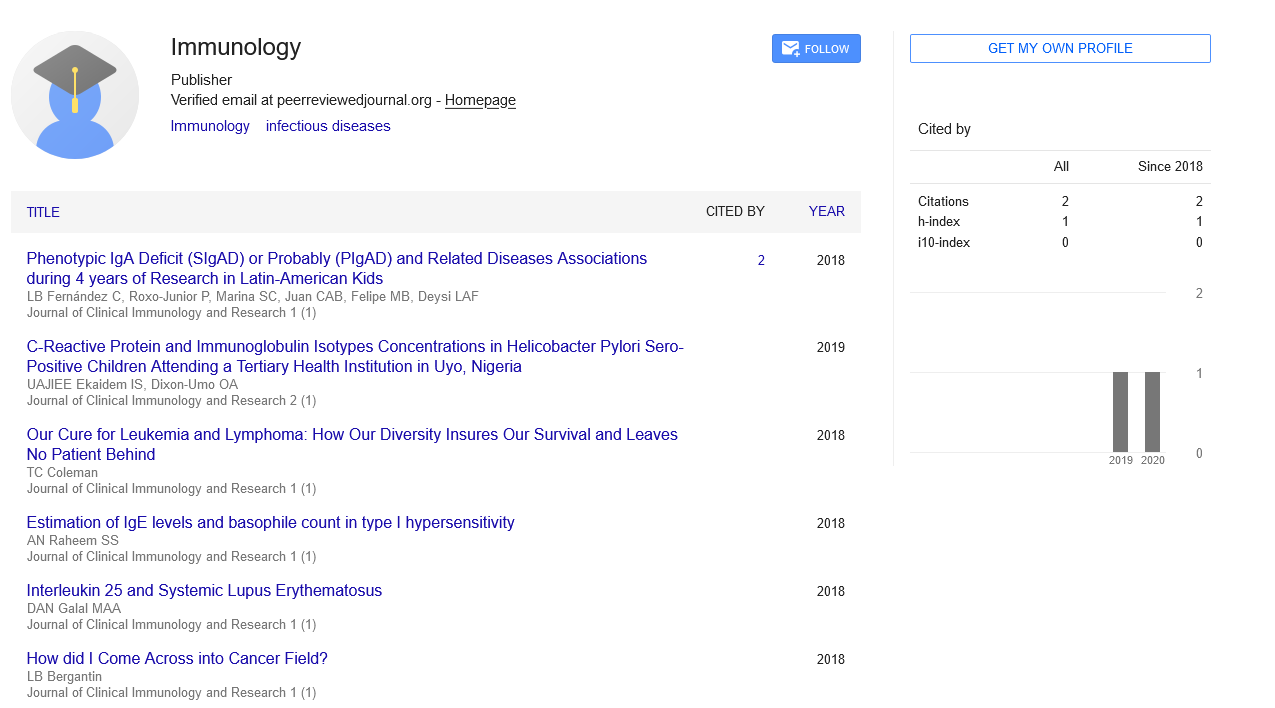Commentary, J Clin Immunol Res Vol: 6 Issue: 2
Humoral Immune Response for Defending the Body against Pathogens
Gino Zou*
1Department of General Practice, Zhejiang University, Hangzhou, China
*Corresponding Author: Gino Zou,
Department of General Practice, Zhejiang
University, Hangzhou, China
E-mail: zougino@gmail.com
Received date: 15 May, 2023, Manuscript No. JCIR-23-104719;
Editor assigned date: 17 May, 2023, PreQC No JCIR-23-104719 (PQ);
Reviewed date: 01 June, 2023, QC No. JCIR-23-104719;
Revised date: 08 June, 2023, Manuscript No. JCIR-23-104719 (R);
Published date: 16 June, 2023, DOI: 10.4172/JCIR.100078
Citation: Zou G (2023) Humoral Immune Response for Defending the Body against Pathogens. J Clin Immunol Res 6:2.
Abstract
Description
The immune system employs a multitude of strategies to protect the body from invading pathogens. One of the key components of this defense mechanism is the humoral immune response, also known as the antibody-mediated immune response. This dynamic process involves the production and deployment of antibodies, specialized proteins that neutralize and eliminate pathogens. The intricacies of the humoral immune response, including the role of B cells, antibody production, immune memory, and the significance of this immune response in safeguarding our health.
Role of B cells in the humoral immune response
B cells are central to the humoral immune response. These specialized immune cells originate in the bone marrow and undergo maturation to become antibody-producing machines. When a B cell encounters an antigen, it recognizes and binds to it using its unique B cell receptor (BCR). This binding activates the B cell, leading to its differentiation into plasma cells that secrete large amounts of antibodies.
Antibody structure and function: Antibodies, also called Immunoglobulins (Ig), are Y-shaped proteins produced by B cells. Each antibody consists of two identical heavy chains and two identical light chains, and each chain contains variable and constant regions. The variable regions determine the antibody's unique antigen-binding specificity, enabling it to recognize and bind to specific antigens. Antibodies have various functions, including neutralizing pathogens by preventing their entry into host cells, marking pathogens for destruction by other immune cells, and activating the complement system to enhance pathogen elimination.
Antibody production and class switching: Upon B cell activation, the production of antibodies begins. During this process, B cells undergo clonal expansion, dividing rapidly to generate a large population of identical B cells. Some of these B cells differentiate into plasma cells, which are antibody factories, while others become memory B cells. Memory B cells provide long-term immunity and are primed to mount a rapid response upon re-exposure to the same pathogen.
B cells have the remarkable ability to undergo class switching, where they change the type of antibody they produce while maintaining the same antigen specificity. This process allows the immune system to generate antibodies of different isotypes, such as IgM, IgG, IgA, and IgE, each with distinct functions and distributions within the body.
Antibody-mediated immunity and pathogen clearance: The humoral immune response plays a imporatant role in clearing pathogens from the body. Antibodies bind to antigens on the surface of pathogens, forming antigen-antibody complexes. This binding process can directly neutralize the pathogen, preventing its entry into host cells. Additionally, antibodies can enhance phagocytosis by opsonization, where they mark pathogens for destruction by immune cells such as macrophages and neutrophils.
Vaccine-induced humoral immunity: Vaccines harness the power of the humoral immune response to protect against infectious diseases. By introducing harmless or weakened forms of pathogens or their components, vaccines stimulate B cell activation and antibody production. This primes the immune system to recognize and mount a rapid and robust response upon subsequent exposure to the actual pathogen, providing immunity and preventing severe illness.
Conclusion
The humoral immune response, driven by B cells and their remarkable ability to produce antibodies, plays a major role in defending the body against pathogens. Through the production of specific antibodies, neutralization of pathogens, opsonization, and activation of the complement system, the humoral immune response contributes to the clearance of infections and the establishment of long-term immune memory. Understanding and harnessing the power of this response has revolutionized vaccine development and continues to drive advancements in therapeutic interventions for infectious diseases and other immune-related disorders.
 Spanish
Spanish  Chinese
Chinese  Russian
Russian  German
German  French
French  Japanese
Japanese  Portuguese
Portuguese  Hindi
Hindi 